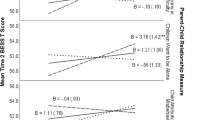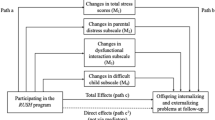Abstract
To date, parenting stress has rarely been examined in clinical samples of mothers with postpartum comorbid Axis-I disorders and Axis-II personality disorders (PD). Previous research has shown important links between maternal psychopathology and the development of child psychopathology. For these reasons, a clinical sample (N = 54) of mothers with various PD and comorbid depression/anxiety disorders were compared in this study. The clinical sample was divided into three groups based on PD: without PD, other PD, and borderline PD (BPD), and then matched according to depression/anxiety diagnoses and age. Parenting stress index (PSI, Abidin, 1995) scores were compared between these subsamples and to a nonclinical control group. No significant differences were found between mothers with various PD on global PSI scores. However, further examination of the PSI subscale scores revealed that PD were linked to an impaired sense of competence and positive reinforcement in relation to parenting. Compared to mothers with other PD, mothers with BPD had significantly more interpersonal issues. Compared to the nonclinical controls, clinically referred mothers had significantly higher PSI global and subscale scores, with notable PD-specific exceptions. These results illustrate the need for more differentiated treatment options for mothers with postpartum depression and/or anxiety disorders with PD to prevent later development of psychopathology in children of these mothers.

Similar content being viewed by others
References
LeCuyer-Maus EA (2003) Stress and coping in high-risk mothers: difficult life circumstances, psychiatric-mental health symptoms, education, and experiences in their families of origin. Public Health Nurs 20:132–145
Milgrom J, McCloud P (1996) Parenting stress and postnatal depression. Stress Med 12:177–186
Pereira J, Vickers K, Atkinson L, Gonzalez A, Wekerle C, Levitan R (2012) Parenting stress mediates between maternal maltreatment history and maternal sensitivity in a community sample. Child Abuse Negl 36:433–437
Barnow S, Spitzer C, Grabe HJ, Kessler C, Freyberger HJ (2006) Individual characteristics, familial experience, and psychopathology in children of mothers with borderline personality disorder. J Am Academ Child Adolesc Psychiatry 45:965–972
Benzies KM, Harrison MJ, Magill-Evans J (2004) Parenting stress, marital quality, and child behavior problems at age 7 years. Public Health Nurs 21:111–121
Cina A, Bodenmann G (2009) Relationship between parental stress and child problem behavior. Kindh Entwickl 18:39–48
Williford AP, Calkins SD, Keane SP (2007) Predicting change in parenting stress across early childhood: child and maternal factors. J Abnorm Child Psychol 35:251–263
Abidin RR (1992) The determinants of parenting behavior. J Clin Child Psychol 21:407–412
Abidin RR (1995) Parenting stress index. Professional Manual, 3rd edn. Psychological Assessment Resources,Inc. Odessa
Gelfand DM, Teti DM, Fox CER (1992) Sources of parenting stress for depressed and nondepressed mothers of infants. J Clin Child Psychol 21:262–272
McClennan Reece S (1995) Stress and maternal adaptation in first-time mothers more than 35 years old. Appl Nurs Res 8:61–66
Mowbray C, Oyserman D, Bybee D, MacFarlane P (2002) Parenting of mothers with a serious mental illness: differential effects of diagnosis, clinical history, and other mental health variables. Soc Work Res 26:225–240
Östberg M, Hagekull B (2000) A structural modeling approach to the understanding of parenting stress. J Clin Child Psychol 29:615–625
Austin MP, Hadzi-Pavlovic D, Priest SR, Reilly N, Wilhelm K, Saint K, Parker G (2010) Depressive and anxiety disorders in the postpartum period: how prevalent are they and can we improve their detection? Arch Women Ment Health 13:395–401
Brockington I (2004) Postpartum psychiatric disorders. Lancet 363:303–310
Matthey S, Barnett B, Howie P, Kavangh DJ (2003) Diagnosing postpartum depression in mothers and fathers: whatever happened to anxiety? J Affect Disord 74:139–147
Reck C, Struben K, Backenstrass M, Stefenelli U, Reinig K, Fuchs T, Mundt C (2008) Prevalence, onset and comorbidity of postpartum anxiety and depressive disorders. Act Psychiatr Scand 11:459–468
Paris J (2003) Personality disorders over time: precursors, course and outcome. J Pers Disord 17:479–488
Cohen P, Chen H, Gordon K, Johnson J, Brook J, Kasen S (2008) Socioeconomic background and the developmental course of schizotypal and borderline personality disorder symptoms. Dev Psychopathol 20:633–650
Winograd G, Cohen P, Chen HN (2008) Adolescent borderline symptoms in the community: prognosis for functioning over 20 years. J Child Psychol Psychiatry 49:933–941
Akman C, Uguz F, Kaya N (2007) Postpartum-onset major depression is associated with personality disorders. Compr Psychiatry 48:343–347
Zimmerman M, Rothschild L, Chelminski I (2005) The prevalence of DSM-IV personality disorders in psychiatric outpatients. Am J Psychiatry 162:1911–1918
Gunderson JG, Lyons-Ruth K (2008) BPD’s interpersonal hypersensitivity phenotype: a gene-environment-developmental model. J Pers Dis 22:22–41
Conroy S, Pariante CM, Marks MN, Davies HA, Farrelly S, Schacht R, Moran P (2012) Maternal psychopathology and infant development at 18 months: the impact of maternal personality disorder and depression. J Am Acad Child Adolesc Psychiatry 51:51–61
Oyserman D, Mowbray CT, Meares PA, Firminger KB (2000) Parenting among mothers with a serious mental illness. Am J Orthopsychiatr 70:296–315
Stepp SD, Whalen DJ, Pilkonis PA, Hipwell AE, Levine MD (2012) Children of mothers with borderline personality disorder: identifying parenting behaviors as potential targets for intervention. Pers Disord Theory Res Treat 3:76–91
Dutton DG, Denny-Keys MK, Sells JR (2011) Parental personality disorder and its effects on children: a review of current literature. J Child Custody Res 8:268–283
De Genna NM, Feske U (2013) Phenomenology of borderline personality disorder: the role of race and socioeconomic status. J Nerv Ment Dis 201:1027–1034
Elliot R-L, Campbell L, Hunter M, Cooper G, Melville J, Mccabe K, Loughland C (2014) When i look into my baby’s eyes… Infant emotion recognition by mothers with borderline personality disorder. Infant Ment Health J 35:21–32
Feldman RB, Zelkowitz P, Weiss M, Vogel J, Heyman M, Paris J (1995) A comparison of the families of mothers with borderline and nonborderline personality disorders. Compr Psychiatry 36:157–163
Gratz KL, Kiel EJ, Latzman RD, Elkin TD, Moore SA, Tull MT (2014) Maternal borderline personality pathology and infant emotion regulation: examining the influence of maternal emotion-related difficulties and infant attachment. J Pers Disord 28:52–69
Hobson RP, Patrick MPH, Hobson JA, Crandell L, Bronfman E, Lyons-Ruth K (2009) How mothers with borderline personality disorder relate to their year-old infants. Br J Psychiatry 195:325–330
Lawson CA (2000) Understanding the borderline mother. Jason Aronson INC, London
Newman LK, Stevenson S, Bergman LR, Boyce P (2007) Borderline personality disorder, mother–infant interaction and parenting perceptions: preliminary findings. Aust N Z J Psychiatry 41:598–605
Zanarini MC, Frankenburg FR, Dubo ED, Sickel AE, Trikha AAL, Reynolds V (1998) Axis I comorbidity of borderline personality disorder. Am J Psychiatry 155:1733–1739
Tackett JL, Sharp C (2014) A developmental psychopathology perspective on personality disorder: introduction to the special issue. J Pers Disord 28:1–4
Hofecker Fallahpour M, Benkert TN, Riecher-Rössler A, Stieglitz RD (2009) Elternschaft und Belastungserleben: psychometrische Überprüfung des Parenting Stress Index (PSI) an einer deutschsprachigen Stichprobe. Psychother Psychosom Med Psych 59:224–233
Wittchen HU, Wunderlich U, Gruschwitz S, Zaudig M (1997) Strukturiertes Klinisches Interview für DSM-IV (SKID). Hogrefe, Göttingen
Association AP (1994) Diagnostic and statistical manual of mental disorders, 4th edn. American Psychiatric Association, Washington
Fydrich T, Renneberg B, Schmitz B, Wittchen HU (1997) SKID-P. Strukturiertes Klinisches Interview für DSM-IV Achse II, Persönlichkeitsstörungen. Hogrefe, Göttingen
Beck AT, Steer RA (1987) Manual for the beck depression inventory. The Psychological Corporation, San Antonio
Beck AT, Steer RA, Garbin MG (1988) Psychometric properties of the beck depression inventory: twenty-five years of evaluation. Clin Psychol Rev 8:77–100
Hautzinger M, Bailer M, Worall H, Keller F (1994) Beck depressions-inventar (BDI). Testhandbuch, Bern, Huber
Derogatis LR (1977) SCL-9OR administration, scoring, and procedures manual. Clinical Psychometric Research, Baltimore
Franke GH (2002) SCL-90-R Symptom Checkliste von L. R. Derogatis. Beltz Test GmbH, Göttingen
Cohen J (1988) Statistical power analysis for the behavioral sciences, 2nd edn. Lawrence Erlbaum Associates, Hillsdale
Agrawal HR, Gunderson J, Holmes BM, Lyons-Ruth K (2004) Attachment studies with borderline patients: a review. Harv Rev Psychiatry 12:94–104
Silverman RC, Lieberman AF (1999) Negative maternal attributions, projective identification, and the intergenerational transmission of violent relational patterns. Psychoanal Dialogues 9:161–186
Linehan MM (1993) Cognitive-behavioral treatment of borderline personality disorder. Guilford Press, New York
Conroy S, Marks MN, Schacht R, Davies HA, Moran P (2010) The impact of maternal depression and personality disorder on early infant care. Soc Psychiat Epidemiol 45:285–292
Author information
Authors and Affiliations
Corresponding author
Ethics declarations
Conflict of interest
On behalf of all authors, the corresponding author states that there are no conflicts of interest.
Rights and permissions
About this article
Cite this article
Ramsauer, B., Mühlhan, C., Mueller, J. et al. Parenting stress and postpartum depression/anxiety in mothers with personality disorders: indications for differential intervention priorities. Eur Child Adolesc Psychiatry 25, 589–600 (2016). https://doi.org/10.1007/s00787-015-0775-4
Received:
Accepted:
Published:
Issue Date:
DOI: https://doi.org/10.1007/s00787-015-0775-4




